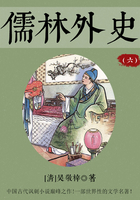IT was not surprising that Mr Peter became such a favourite at Cranford. The ladies vied with each other who should admire him most; and no wonder, for their quiet lives were astonishingly stirred up by the arrival from India - especially as the person arrived told more wonderful stories than Sindbad the Sailor; and, as Miss Pole said, was quite as good as an Arabian Night any evening. For my own part, I had vibrated all my life between Drumble and Cranford, and I thought it was quite possible that all Mr Peter's stories might be true, although wonderful; but when I found that, if we swallowed an anecdote of tolerable magnitude one week, we had the dose considerably increased the next, I began to have my doubts; especially as I noticed that when his sister was present the accounts of Indian life were comparatively tame; not that she knew more than we did, perhaps less. I noticed also that when the rector came to call, Mr Peter talked in a different way about the countries he had been in. But I don't think the ladies in Cranford would have considered him such a wonderful traveller if they had only heard him talk in the quiet way he did to him. They liked him the better, indeed, for being what they called "so very Oriental."
One day, at a select party in his honour, which Miss Pole gave, and from which, as Mrs Jamieson honoured it with her presence, and had even offered to send Mr Mulliner to wait, Mr and Mrs Hoggins and Mrs Fitz-Adam were necessarily - excluded one day at Miss Pole's, Mr Peter said he was tired of sitting upright against the hard-backed uneasy chairs, and asked if he might not indulge himself in sitting cross-legged. Miss Pole's consent was eagerly given, and down he went with the utmost gravity. But when Miss Pole asked me, in an audible whisper, "if he did not remind me of the Father of the Faithful?" I could not help thinking of poor Simon Jones, the lame tailor, and while Mrs Jamieson slowly commented on the elegance and convenience of the attitude, I remembered how we had all followed that lady's lead in condemning Mr Hoggins for vulgarity because he simply crossed his legs as he sat still on his chair. Many of Mr Peter's ways of eating were a little strange amongst such ladies as Miss Pole, and Miss Matty, and Mrs Jamieson, especially when I recollected the untasted green peas and two-pronged forks at poor Mr Holbrook's dinner.
The mention of that gentleman's name recalls to my mind a conversation between Mr Peter and Miss Matty one evening in the summer after he returned to Cranford. The day had been very hot, and Miss Matty had been much oppressed by the weather, in the heat of which her brother revelled. I remember that she had been unable to nurse Martha's baby, which had become her favourite employment of late, and which was as much at home in her arms as in its mother's, as long as it remained a light-weight, portable by one so fragile as Miss Matty. This day to which I refer, Miss Matty had seemed more than usually feeble and languid, and only revived when the sun went down, and her sofa was wheeled to the open window, through which, although it looked into the principal street of Cranford, the fragrant smell of the neighbouring hayfields came in every now and then, borne by the soft breezes that stirred the dull air of the summer twilight, and then died away. The silence of the sultry atmosphere was lost in the murmuring noises which came in from many an open window and door; even the children were abroad in the street, late as it was (between ten and eleven), enjoying the game of play for which they had not had spirits during the heat of the day. It was a source of satisfaction to Miss Matty to see how few candles were lighted, even in the apartments of those houses from which issued the greatest signs of life. Mr Peter, Miss Matty, and I had all been quiet, each with a separate reverie, for some little time, when Mr Peter broke in - "Do you know, little Matty, I could have sworn you were on the high road to matrimony when I left England that last time! If anybody had told me you would have lived and died an old maid then, I should have laughed in their faces."
Miss Matty made no reply, and I tried in vain to think of some subject which should effectually turn the conversation; but I was very stupid; and before I spoke he went on - "It was Holbrook, that fine manly fellow who lived at Woodley, that I used to think would carry off my little Matty. You would not think it now, I dare say, Mary; but this sister of mine was once a very pretty girl - at least, I thought so, and so I've a notion did poor Holbrook. What business had he to die before I came home to thank him for all his kindness to a good-for-nothing cub as I was?
It was that that made me first think he cared for you; for in all our fishing expeditions it was Matty, Matty, we talked about. Poor Deborah! What a lecture she read me on having asked him home to lunch one day, when she had seen the Arley carriage in the town, and thought that my lady might call. Well, that's long years ago; more than half a life-time, and yet it seems like yesterday! I don't know a fellow I should have liked better as a brother-in-law.
You must have played your cards badly, my little Matty, somehow or another - wanted your brother to be a good go-between, eh, little one?" said he, putting out his hand to take hold of hers as she lay on the sofa. "Why, what's this? you're shivering and shaking, Matty, with that confounded open window. Shut it, Mary, this minute!"















